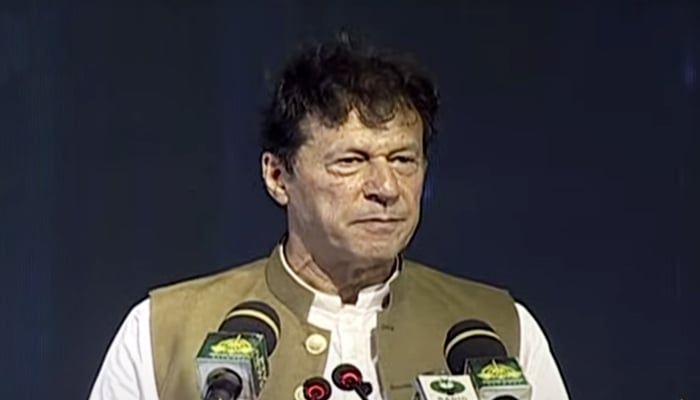'Pained' me to see Minar-e-Pakistan incident: PM Imran Khan
"The Minar-e-Pakistan incident, when I saw it, I was ashamed, it pained me to see it," Prime Minister Imran Khan says
The Minar-e-Pakistan incident — in which scores of men assaulted a woman on Independence Day — was a source of shame for Pakistan, Prime Minister Imran Khan said Wednesday, saying that it "pained" him to see it.
"The Minar-e-Pakistan incident, when I saw it, I was ashamed, it pained me to see it. No one could have imagined such an incident taking place [in Pakistan] when I was growing up," PM Imran Khan said, during an event in Lahore.
The premier said he has travelled across the world, and while he was growing up, he had observed that Pakistanis respected women much more than the Western world.
"The downfall that we are witnessing is because our children are not being educated in the right manner. This is not a part of our culture and neither of our religion," he said, referring to the behaviour that was displayed by the mob, at the Greater Iqbal Park in Lahore on August 14.
The prime minister said "sex crimes" in Pakistan were on the rise, and blamed it on the negative side of the use of mobile phones. "In human history we never witnessed the kind of exposure to things that children have nowadays," he said.
He noted that to curb such incidents, "there is only one way". "Children must be taught about the life of Prophet Muhammad (PBUH)," he said, adding that he was the "greatest human being, the likes of which will never again be seen".
The prime minister said people read about successful people to learn of the secrets of their success — and no one in history is as successful as Prophet Muhammad (PBUH). "Which is why we have been told in the Holy Quran to learn from his life."
"[The children must be taught] how he brought about a historic revolution. What his qualities were. How he was honest and trustworthy — and how no person has become a great leader without these qualities," the prime minister said.
The premier said Quaid-e-Azam Muhammad Ali Jinnah and former president of the South African Republic Nelson Mandela were regarded as honest and trustworthy even by their rivals.
"So these qualities, which made him so great, should be taught to our children in schools.
"And so alongside being taught about the latest technology — what we have envisioned for grades 8, 9 and 10 — this also has to be enforced. Both these things have to be enforced in the school curriculum," the prime minister said.
The prime minister lauded Punjab Minister for Education Murad Ras for his "passion" for the field of education and for starting the implementation of the Single National Curriculum (SNC) in the province.
He said passion is something that trumps talent in many areas.
"And when we see passion in a chief minister or [other minister], we back the ministry. Because we can see the person is working wholeheartedly."
He hoped that in the next two years, Ras will be able to fully implement the new curriculum and "lift the standards of government schools".
PM Imran Khan noted that private schools "were doing an excellent job", but a family only sends their children there if they have money.
"In Pakistan, our real talent is mostly found in government schools," he added.
The prime minister also heaped praise on Chief Minister Punjab Usman Buzdar for his works in the province. "The past governments would do little work but trumpet their horns to no end over it."
The prime minister slammed past regimes for not focusing on education and development. "A military dictator built two dams, a task which democrats were unable to accomplish."
He also lashed out at his predecessors for not thinking about the future generations and damaging the country's progress with "short-term planning".
"Even the forests that the British left behind have been destroyed."
Speaking about education, he said when the country got independence, a uniform curriculum should have been rolled out, as now, there was a divide in this sector.
"Three different curriculums were introduced, and we became mentally enslaved to the British. And when a nation also becomes a cultural slave, it cannot progress."
The prime minister regretted that there were only a few good schools that were accessible only to the elite. "Gradually, we witnessed the downfall of government schools and the rise of private schools."
-
Security forces gun down 30 terrorists in multiple IBOs in KP: ISPR
-
MQM-P calls for new province in Sindh
-
US report validates Pakistan military edge over India: PM
-
Banned TTP poses serious threat to Pakistan security: UNSC panel
-
CM Afridi clarifies remarks on by-poll after ECP requests army deployment
-
Dubai sees 3.2m Pakistani passengers in 2025 as airport sets new milestone
-
Security forces kill 23 Indian proxy terrorists in KP's Kurram
-
Pakistan to construct island to boost oil exploration: report












